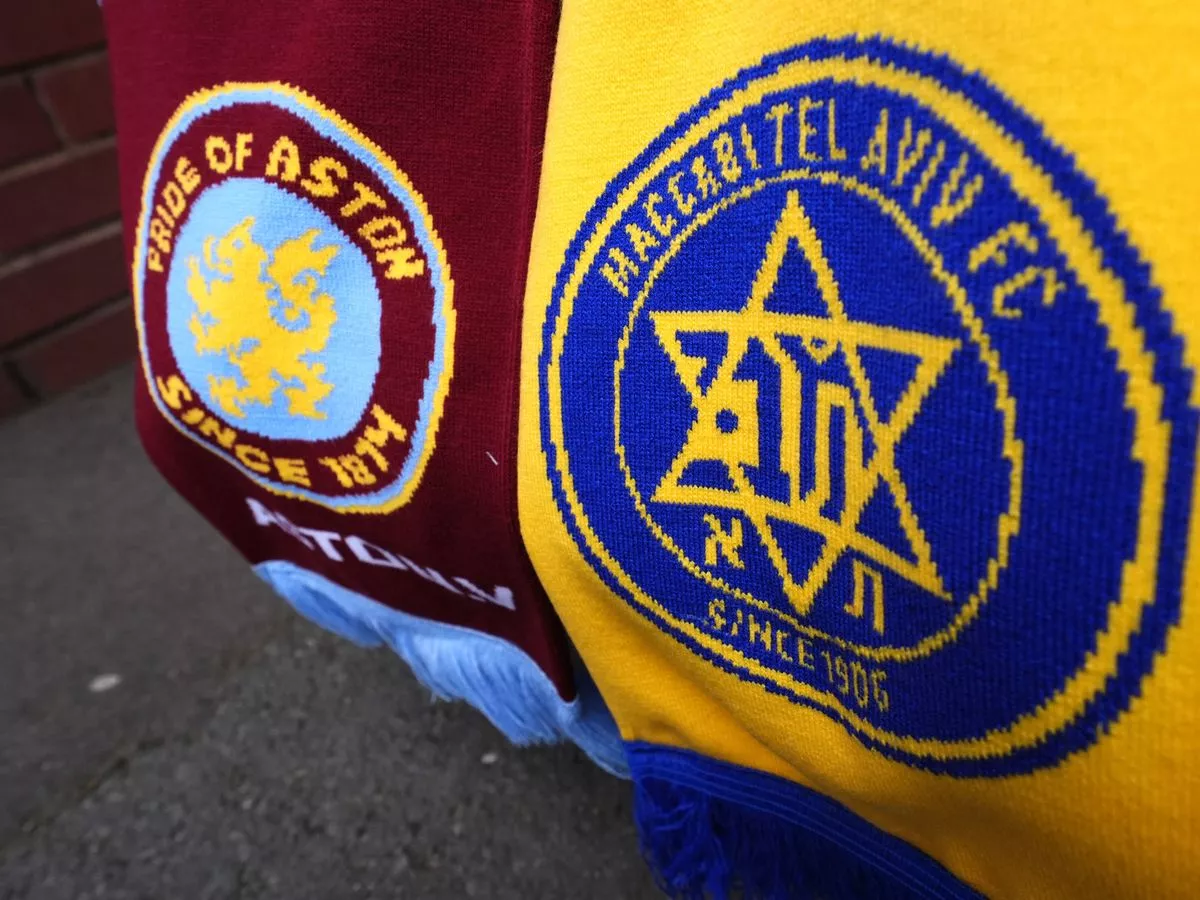Copyright birminghammail

The truth about the intelligence used by West Midlands Police to prompt a ban on fans from Israeli club Maccabi Tel Aviv for their Europa League tie against Aston Villa is finally out, despite attempts to suppress it. The eight-page internal report, leaked to BirminghamLive, revealed that a 'high risk' of disorder triggered by hundreds of 'fighting experienced' hooligans linked to the Israeli club, some with IDF links, was the key reason for the ban. It also confirms for the first time that West Midlands Police feared there might also be attacks on Maccabi fans as a result of a pro-Palestine, anti-Israel pushback, along with potential trouble from far right activists drawn to the city. READ MORE: Flare-ups and arrests at Villa-Maccabi protests as police 'keep peace' in massive operation Together that could create a flashpoint in Aston that could potentially need thousands of officers to quell. The report reveals for the first time that West Midlands Police's chief constable Craig Guildford, under personal attack from politicians over the ban decision, commissioned a peer review into his actions by the National Police Chiefs Council and the UK Football Policing Unit, which concluded he did the right thing based on the information available. It also reveals that police, Villa, Jewish groups and community organisations attempted to find a new way forward that would allow some Maccabi fans to attend after all, only for the Israeli club to steal a march on a potential u-turn by rejecting their ticket allocation. Under the police's logo and headed 'Op Parkmill Considerations' the report sets out the intelligence that was gathered and presented by senior officers to Birmingham's Safety Advisory Group earlier last month that prompted the decision to ban away fans. They rated the match 'high risk' by giving it a score of 77 against a UK Football Policing Unit matrix - one of the highest possible. When first announced, the decision was slated by senior politicians led by Prime Minister Keir Starmer and Home Secretary Shabana Mahmood as 'potentially antisemitic', triggering a huge backlash. Senior Tories also piled in, including former mayor Andy Street and party leader Kemi Badenoch. Culture Secretary Lisa Nandy went on to say the ban was due to a fear of attacks on the Maccabi fans, not by them, and was 'antisemitic'. It led to claims that Birmingham was a 'no go zone' for Jews. That was seen as a direct attack on senior police and council officials who made the final call. Nandy has since been challenged to apologise to the police but has refused. She has also been slated for accusing local politicians including the area's MP Ayoub Khan of sowing division over the match. READ MORE: UK Government doing 'everything in its power' to let Tel Aviv fans attend Villa match The report had been supressed by police and the city council in the run-up to the match, triggering widespread speculation. At one point, the police's press office denied the contents of the report we now have, claiming an earlier press story citing some of its contents was 'not recognised'. Now we have a copy, we can see that those earlier reports were in fact accurate. The report noted the match had triggered 'great concern' among Jewish, Muslim, Black, business and local resident groups, with fears of attacks on individuals and also on businesses and 'key landmarks' in the area. The assessment found a 'significant minority' of Maccabi's fans were part of an ultras group called Maccabi Fanatics who had 'strong political leanings' and 'affiliations to the Far Right'. They have a history of racist behaviour 'including monkey noises towards black players' and a 'concerning history of violence and disorder at home and away', claimed the report. They were likely to 'use pyrotechnics and gather in large numbers', police said. Equally, some Israeli fans had expressed to the club a reluctance to travel to Birmingham because they viewed it as 'anti Israel with a heavy Muslim population'. The club had requested physical tickets so they could check them off against passports of each recipient before sale as part of club efforts to curb attendance by potential troublemakers. The most damning intelligence came from Dutch police who had been involved in quelling major disorder in Amsterdam last year, when Ajax played the Israeli club. More than 2,800 Israeli fans attended that match, including 'over 200 linked to the Israeli Defence Forces' - the Israeli army that has been leading the assault on Gaza and defending the Israelis from Hamas attacks. You can read the full detail of that section of the report here The Dutch police told their counterparts that a series of pre-match attacks by Maccabi ultras on Muslim communities and incitement including anti Arab chants had triggered retaliation and attacks on Maccabi fans, with massive disruption. Some 5,000 police had to quell disorder which ran over three days. The Villa game had the potential for serious and sustained violence from risk elements of Maccabi fans, leaving local communities 'extremely concerned and in fear', along with the potential for significant protests and "disruption to city centre and wider Birmingham". The police ruled out alternatives including playing the game behind closed doors as potentially more impartial 'but not fair to Aston Villa fans who have no recent history of disorder'. It would also cause likely tensions with Villa and UEFA and 'may not be legally sound'. Having no Maccabi Tel Aviv fans was seen to be the 'least risky' option. "This would significantly reduce the tension between local communities and will take away a significant focus of serious disorder," the report states. The officers acknowledged "this may be seen as antisemitic or anti-Israel" both locally and nationally and would thus need to be 'carefully managed to ensure the rationale for any decision is clearly understood'. But they also said restricting away fans was a 'tried and tested tactic', with precedents at recent European games. These included a ban on Lazio fans from the match against Ajax last year for fear of far right racism and antisemitism; a one match ban on Glasgow Rangers fans at a European game for 'sectarian chanting'; and a recent ban on Eintracht Frankfurt fans attending versus Naples 'due to fears of violence'. A year ago Barcelona supporters were banned from attending the match against Red Star Belgrade due to the 'racist behaviour of their supporters' during an earlier match in Monaco, stated the report. First produced in early October, the report then included further updates about the events that had unfolded since. The affair had triggered 'significant media and political interest', the police noted. A personal post by the Prime Minister 'resulted in international debate regarding the perception that the decision was antisemitic and that it should be reviewed. Opinions have been polarised and caused significant concern, particularly within Jewish communities worldwide', states the report update. Since the original ban was announced, there had been further trouble at a derby match played in Tel Aviv, with dozens of smoke grenades and pyrotechnics thrown, with 15 injured including three police officers. In one aside, the report added: "In a scenario familiar to officers in the UK, the police were blamed for the violence." There had also been reports of far right influencer Tommy Robinson, hardcore Chelsea fans and members of the English Defence League (EDF) all turning up, triggering more risks. But, under pressure from the Home Office, the police had been considering 'allowing a number of Maccabi fans into the stadium', the report reveals. This was abandoned when the Tel Aviv club refused its ticket allocation. West Midlands Police were asked why they did not provide answers to questions about the fan ban earlier, or why the media had to rely on leaked reports rather than full briefings from officers that could have eased wrongful speculation. They said: "Our original statement did not go into specifics as it wasn’t deemed necessary or helpful at that time. "When the political commentary around antisemitism developed, our priority was to engage key stakeholders within the Jewish community. We explained the hooliganism element very candidly to them, and we have since been working with those community members on how to deal with what is a very sensitive matter." They added: "As with any sensitive policing operation, there is a balance to be struck between informing communities and giving away too much operational information." A major police operation was still required in the city on the night of the Villa game against Maccabi Tel Aviv last Thursday, November 6. Some 700 police were deployed to keep the peace, with 11 arrests made on the night. There were flare ups and confrontations but no significant outbreaks of violence or damage.



